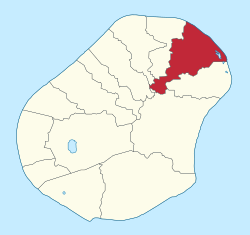Anabar District
Anabar | |
|---|---|
 Anabar District within Nauru | |
| Coordinates: 0°31′0″S 166°57′0″E / 0.51667°S 166.95000°E | |
| Country | |
| Constituency | Anabar |
| Area | |
• Total | 1.5 km2 (0.6 sq mi) |
| Elevation | 25 m (82 ft) |
| Population (2021) | |
• Total | 565[1] |
| Time zone | (UTC+12) |
| Area code | +674 |
Anabar is a district in the Pacific country of Nauru.[citation needed]
Geography
It is part of the Anabar Constituency[citation needed]. It is located in the northeast of the island, covers an area of 1.5 km2[citation needed] and has a population of 565 (2021).[1]
History
Anabar, along with neighbouring district of Ijuw, is believed to be the 3rd areas to submerged after Buada first and Anibare second about 3000+ years ago.[citation needed]
Its first inhabitants are Deiboe clans people, led by Deianoang, who fled to save his family of three daughters, from the raging war of Atemor's open field between Eamwit clansmen off Anuquoge village and his clan, the Deiboe people from Ganokoro.
Irutsi clan was born amongst the rocky regions of Abodeatsi where three men slaves and two slave women met during a month-long hide amidst the rocky region, who five slave people later intermarried each other to expand the population along the rocky regions of Anabar.
Anabar's pond 'Tibinor' was the deepest pond on the island. Such legends like the ones of 'Amwieob' originated in Anabar.
Like Buada, Anabar had its own dialect, a way of speaking which the natives refer to as the "Kin'nir", nothing similar to the "E'koro" language in the Arenibok village.
Notable people
- Ludwig Scotty, President of Nauru in 2003, and from 2004 to 2007, represented Anabar in Parliament of Nauru.[citation needed]
See also
References
- ^ a b Nauru 2021 Population and Housing Census - Analytical Report, Noumea: Pacific Community (SPC) and Government of the Republic of Nauru (Nauru) 2023, 9 August 2023, p. 27, archived from the original on 7 September 2023, retrieved 2 May 2024
External links
![]() Media related to Anabar at Wikimedia Commons
Media related to Anabar at Wikimedia Commons

